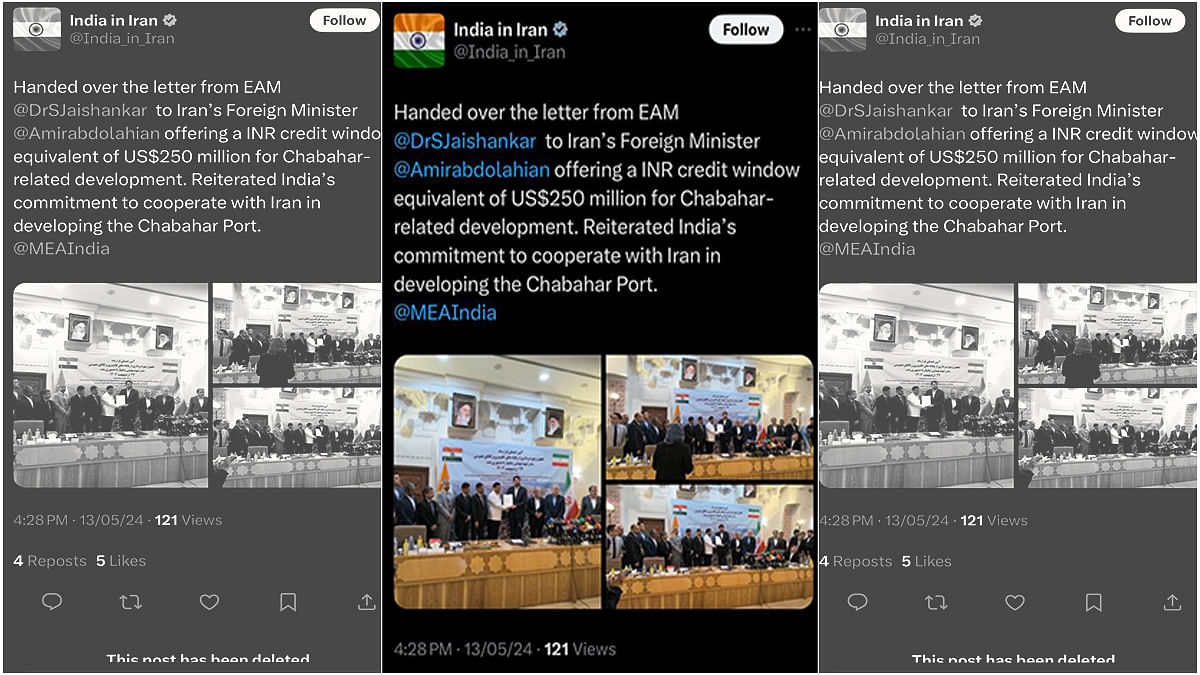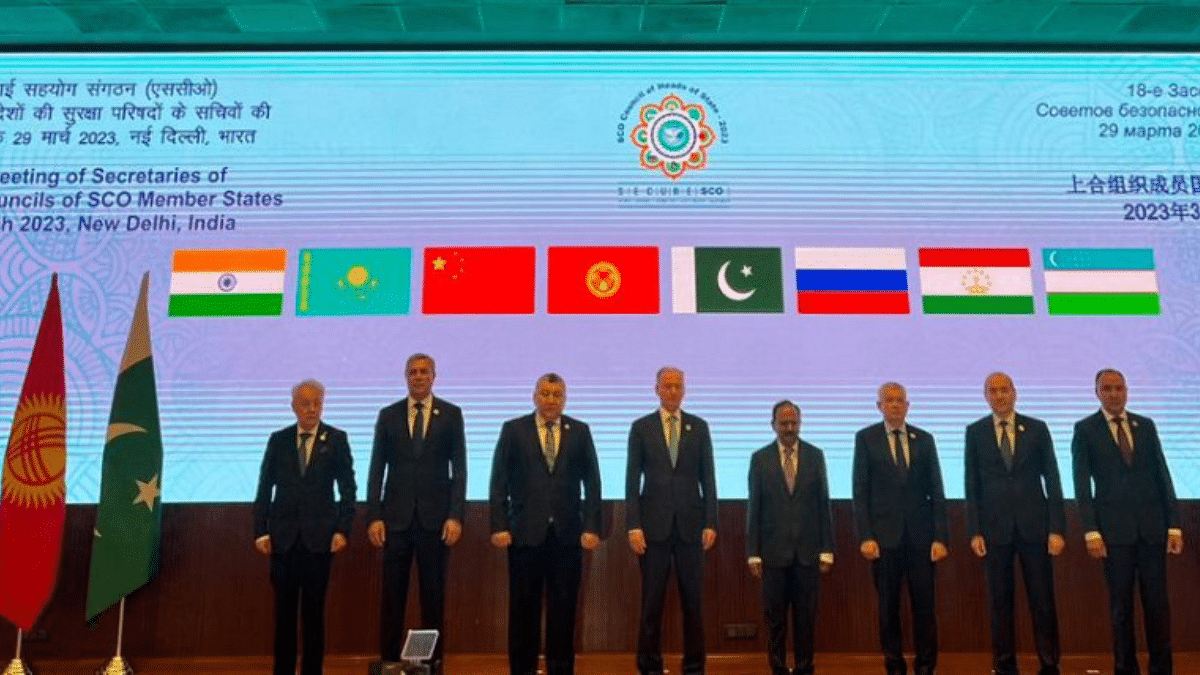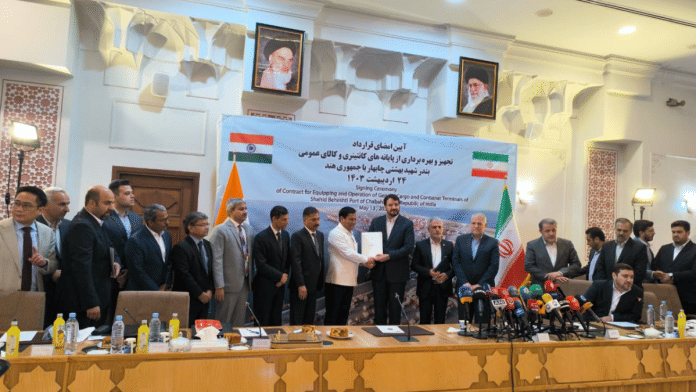New Delhi: India’s first-ever overseas port investment in Iran’s Chabahar got a boost Monday after Tehran and New Delhi signed a long-term contract. This will allow India Ports Global Private Limited (IPGPL), an Indian state-owned entity, to manage and operate a terminal in the port for 10 years, instead of having to renew a short-term contract every year as was the case earlier.
India is also believed to have agreed to extend a credit line of $250 million to Iran for Chabahar-related development, according to a statement by India’s embassy in Iran on X. The statement was subsequently deleted.

Shipping Minister Sarbananda Sonowal signed the deal with Mehrdad Bazrpash, Minister of Roads and Urban Development of Iran, in Tehran on Monday morning.
The development comes as elections in India are underway and amid tensions in West Asia over the war in Gaza.
ThePrint had last month reported that the long-term contract could be signed “within weeks”. Diplomatic sources told ThePrint that terms of the deal were finalised months ago but certain “legal issues” were pending, which have now been ironed out.
Currently, a war between Israel and Iran-backed Hamas rages in Gaza and weeks prior, Tel Aviv and Tehran briefly entered into a direct military conflict.
The Chabahar deal has been signed on a “sombre” day in Israel, diplomatic sources told ThePrint.
Today marks Yom HaZikaron (Memorial Day), which commemorates soldiers and people who lost their lives during the struggle to defend the State of Israel. “This year, it’s especially sad as so many more victims lost their lives due to terror and battle,” the sources added.
External Affairs Minister S. Jaishankar called the Chabahar deal a “crucial contract” that would clear the path for bigger investment in the port.
India operates one of the two terminals at Chabahar Port – the Shahid Beheshti terminal. The partnership on Chabahar Port was established during Prime Minister Narendra Modi’s visit to Iran in 2016. India has committed over $500 million to the port over the last eight years.
Unlike Iran’s busiest port, Bandar Abbas, Chabahar is located closer to India’s west coast and is a deep-sea port that can accommodate full-size container ships. The Chabahar port is a strategic investment for India which has also been using it to send humanitarian aid to Taliban-ruled Afghanistan for the last two years.
According to Kabir Taneja, Fellow at Observer Research Foundation (ORF), the signing of the long-term contract for Chabhar is not “path-breaking” as India has been operating one terminal there since 2018 and has handled over 5 million tons of bulk cargo since taking over operations.
“However, it does show that Chabahar Port is still central to India’s strategic thinking. The ground is being set for Iranian President Raisi’s visit to India, expected to take place this year,” he added.
Also Read: A dormant transport corridor between India, Russia, Iran is active 20 years later. Here’s why
A counterbalance to Pakistan’s Gwadar Port?
Analysts say that the signing of the Chabahar deal is a “win-win” for both sides. It helps Iran — a recent addition to the Shanghai Cooperation Organization (SCO) after years of isolation on the global stage — demonstrate to other countries that it is a reliable partner that can make good on bilateral deals, according to Subhomoy Bhattacharjee, advisor to India’s shipping ministry.
“For India, this ticks all of the boxes including sending a message to Pakistan and China that have a hand in Gwadar port nearby. Iran’s recent tiff with Pakistan makes this a win-win for everyone,” he told ThePrint, referring to Iran and Pakistan attacking militant bases in each other’s territory in January.
The Gwadar port, located in Pakistan and funded by China, sits a mere 172 km away from Chabahar.
“Gwadar and Chabahar have a sister city pact on trade, so (I am) not sure what counterbalance we would see. What India needs to do is commit more resources to building Chabahar further, considering China is now the biggest importer of Iranian oil and will automatically hence have more leverage in Tehran,” Taneja told ThePrint.
Gwadar and Chabahar have often been referred to as sister ports. In 2016, Iran’s then-ambassador to Pakistan claimed that Chabahar port authorities would “extend cooperation” to Gwadar. Later in 2021, during the Raisina Dialogue in Delhi, Iranian Foreign Minister Javad Zarif said the Chabahar Port is neither against the Chinese nor against Pakistan’s Gwadar Port.
The two ports are strategically located at the entrance of the Strait of Hormuz.
In recent years, India has been pushing for Chabahar to be linked with the International North–South Transport Corridor (INSTC), a route which gives India access to Central Asian and Eurasian markets while bypassing Pakistan. Last March, National Security Advisor (NSA) Ajit Doval reiterated this demand while speaking at an NSA-level meeting of the SCO in Delhi.

However, before Chabahar is linked with INSTC, it requires much-needed infrastructure investment, says Bhattacharjee. “Chabahar can’t be used for transit of oil or petroleum goods yet, unlike Bandar Abbas. Much more needs to be done there,” he explained.
In August 2022, Sonowal visited Iran and handed over six mobile harbour cranes (MHC) to Iran’s Chabahar as part of a $25 million contract.
(Edited by Tony Rai)
Also Read: Indian woman cadet on vessel seized by Iranian military returns home







Nice points. Doubts exist if it is really to counter Gwadar, when it may find a challenge from Bandar Abbas itself. Indian companies engaging with Chhabahar haven’t faced sanctions but those dealing with Iranian energy sector have. China meanwhile routing Iranian crude allegedly through Malaysia & an USD 400 billion infra deal has gained considerable leverage.